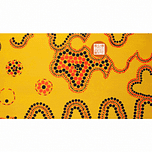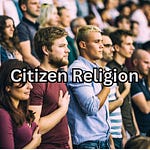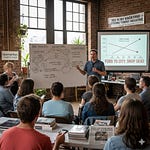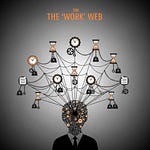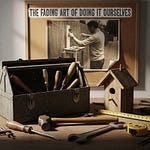This discussion explores how our perception of time and our historical narratives profoundly shape our individual and collective realities.
I kick off the episode by sharing two observations from Frithjof Bergmann: the matter-of-factness with which most patients discussed their own dying, and the immense diversity in their attitudes towards death, mirroring their unique views on life 🕊️.
The conversation then expands to a macro perspective, examining how different cultures measure and relate to time, some with clear delineations and others with none at all 🌍. This cultural lens also considers how societies view their collective "lot in life" and the historical baggage that influences their present focus. Religion, particularly the Catholic view of earthly life as a form of purgatory, is presented as a significant cultural factor shaping attitudes towards time and destiny ⛪.
A significant portion of the episode is dedicated to historical revisionism, a concept I argue is more prevalent than ever in 2025 📚. I provide compelling examples:
Justifying Present Actions: The narration of the past often serves as a justification for current actions, evident in geopolitical events in Europe since February 2022.
The Domino Effect and Communism: I recall the Cold War's "domino theory" and its communist corollary – the belief that a communist country could not revert, leading to justifications like the Soviet invasion of Afghanistan in 1979 🇦🇫.
American Exceptionalism and Repetition: The ongoing narrative of American exceptionalism is explored, with repetitions of past patterns like the 18th Amendment banning alcohol, partly justified by prejudices against immigrants 🥃. This historical revisionism culminated in the 1924 Immigration Act, which reversed immigration quotas, a pattern I see mirrored in contemporary issues
Ice Ice Baby 🧊
The 1619 Project and DEI: I highlight the backlash against initiatives like The 1619 Project, which aimed to reframe American history through the lens of slavery, and the ongoing resistance to Diversity, Equity, and Inclusion (DEI) efforts, both in the US and abroad ✊🏽. I connect this to Arlie Hochschild's "deep story" theory, where people construct narratives to cope with declining quality of life and identify "cu😠.
The discussion shifts to a philosophical perspective, focusing on existentialism and its view of human existence. I reference Jean-Paul Sartre's idea that "we are condemned to be free," emphasizing that while we always have a choice, it's a profound burden ⛓️. Viktor Frankl's pursuit of meaning in dire situations is also cited as a powerful example of fostering existence and purpose. Hannah Arendt's concept of vita activa is introduced, differentiating it from labor and suggesting that true satisfaction comes from "just being" ✨.
I then bring these complex ideas to the personal level, asserting that historical revisionism impacts us individually. I note how our continuous experiences shape our views of the past, acknowledging that while knowledge can help us understand and deal with situations better, it also confronts us with the "ugly flip side" of trauma. I observe how people's viewpoints can change over time, sometimes becoming more risk-averse or overtly prejudiced, often influenced by media narratives like those from the alt-right 📢.
The episode further explores the contemporary form of colonialism, arguing that placing countries in debt to gain access to their resources is a modern manifestation of this historical practice 💰. I link this to how some countries in the Global South use historical revisionism to justify existing borders and power bases.
On a personal note, I discuss the book "The Way We Never Were" by Stephanie Coontz, highlighting the illusion of the "golden fifties" nuclear family and how economic motivations often override moralistic views of family structures 👨👩👧👦. I also use the example of German reunification to illustrate how nostalgia can lead us to forget negative aspects of the past and romanticize the "good old days," even for a world that didn't truly exist 🇩🇪.
Finally, I return to Hannah Arendt's idea about the importance of tradition, suggesting that while some traditions should be discarded (such as those related to injustice), many are part of a continuum and discarding them without understanding their value can be detrimental 🤔. I critique the dualistic thinking of being "slaves or free" and emphasize the conscious choice we make to live within constraints, even as we are "condemned to be free". The episode concludes with a call for greater awareness of societal manipulation, a re-evaluation of our values (or lack thereof), and the importance of freeing ourselves from the shackles of past trauma, particularly for future generations 🤝. I close with a poignant thought from the piece quoted in the beginning of the show, "The Diversity of Death" from Frithjof Bergmann, suggesting that our view of death is closely aligned with our view of life, and cultivating a positive attitude in the present is key to an emergent future🌅.

